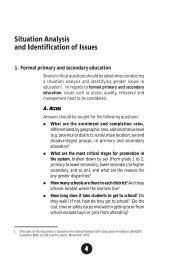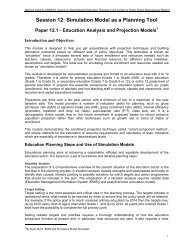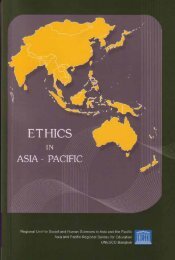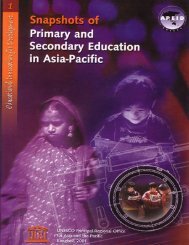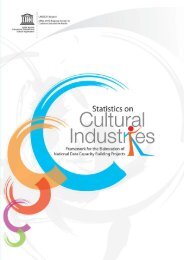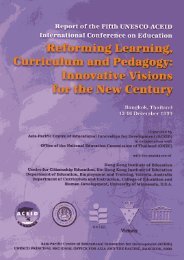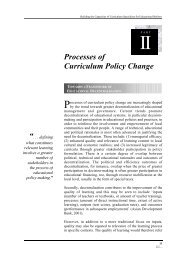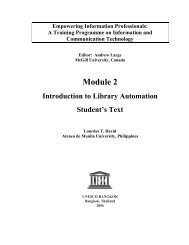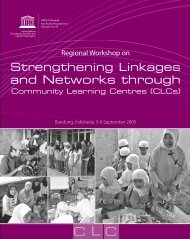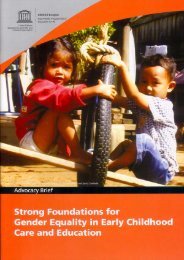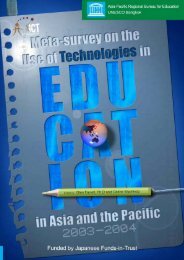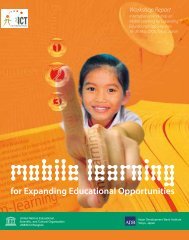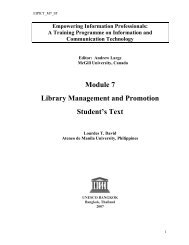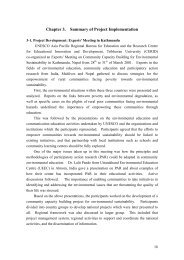Educational Finance in Thailand - UNESCO Bangkok
Educational Finance in Thailand - UNESCO Bangkok
Educational Finance in Thailand - UNESCO Bangkok
Create successful ePaper yourself
Turn your PDF publications into a flip-book with our unique Google optimized e-Paper software.
F<strong>in</strong>al Report, Volume II/3 Anthony. Cresswell: <strong>Educational</strong> <strong>F<strong>in</strong>ance</strong> <strong>UNESCO</strong>-PROAP TA 2996-THA<br />
Education Management and <strong>F<strong>in</strong>ance</strong> Study July 1999<br />
2.5.2 The Parental Choice focus groups<br />
a. To explore the possible impacts of a free choice scheme <strong>in</strong> <strong>Thailand</strong>, a study<br />
was conducted based on a small sample of parent focus groups. S<strong>in</strong>ce the concept<br />
of free choice is a complex one, it was felt that focus group-based discussion with<br />
parents would be the best way to explore the full range of their attitudes and<br />
potential responses to a free choice scheme. To help assess the effects of <strong>in</strong>come<br />
and range of available choices on possible responses, the focus groups were<br />
formed <strong>in</strong> four districts, two <strong>in</strong> a high <strong>in</strong>come prov<strong>in</strong>ce and two <strong>in</strong> a relatively low<br />
<strong>in</strong>come prov<strong>in</strong>ce. The districts were chosen to reflect either a relatively high or<br />
low level of choice <strong>in</strong> terms of the number of nearby schools. Four schools were<br />
chosen <strong>in</strong> each district, one two each at the primary or secondary level, one public<br />
one private (one district did not have a private secondary school so the total<br />
number of schools chosen was 15). A group of 7-10 parents from each school was<br />
<strong>in</strong>vited to attend a focus group discussion <strong>in</strong> an even<strong>in</strong>g session, held off school<br />
property. The group discussion was recorded and summarized by the research<br />
team. (A detailed analysis of the parent’s comments is found <strong>in</strong> Appendix).<br />
b. The results of this focus group study reveal considerable complexity <strong>in</strong> parent’s<br />
views of school choice. The results also show that the impacts of a free choice<br />
scheme on the actual attendance patterns and parental choices will be very hard to<br />
predict. First, it was clear from the comments that parents have high expectations<br />
for their students and their schools. The comments reveal parents with a very high<br />
value for education, and a strong will<strong>in</strong>gness to support education f<strong>in</strong>ancially, and<br />
f<strong>in</strong>d the best schools for their children. As a result, the parents take <strong>in</strong>to account<br />
more than expenses when choos<strong>in</strong>g a school. The most frequently mentioned<br />
concerns were the reputation of the school, quality of teach<strong>in</strong>g and school<br />
facilities, safety, closeness to home, attitudes and behavior of teachers, good<br />
discipl<strong>in</strong>e, and number and quality of activities and equipment. Of course the cost<br />
of send<strong>in</strong>g children to school was mentioned frequently as well, but the cost<br />
factors mentioned extend beyond tuition and fees to cloth<strong>in</strong>g, transportation, food,<br />
and other <strong>in</strong>cidentals. But it seems clear <strong>in</strong> the comments that f<strong>in</strong>ancial<br />
considerations are only one, and not necessarily the major factor <strong>in</strong> this decision<br />
process.<br />
c. Because this is a multi-factor problem, <strong>in</strong>troduc<strong>in</strong>g the free choice as away of<br />
alleviat<strong>in</strong>g the f<strong>in</strong>ancial considerations does not by itself seem to produce massive<br />
changes <strong>in</strong> choices. All parents were asked what school they would choose if they<br />
did not have to pay for tuition and fees. Overall, only 38 of the 105 parents who<br />
responded (36.2%) said they would choose another school. In the districts with<br />
high choice (many alternative schools) the proportion who would change<br />
<strong>in</strong>creased to 41%, a significant shift, but still well below half. And almost half of<br />
those who chose different schools (10/23) came from one primary school.<br />
d. The pattern of choice between public and private school alternatives is also<br />
illustrative of the importance of non-f<strong>in</strong>ancial concerns. Of the 38 parents who<br />
would choose a different school, 33 (87%) chose public schools. The reasons<br />
expressed for these choices were predom<strong>in</strong>ately quality concerns, with<br />
convenience and safety mentioned frequently as well. If these results are<br />
81



